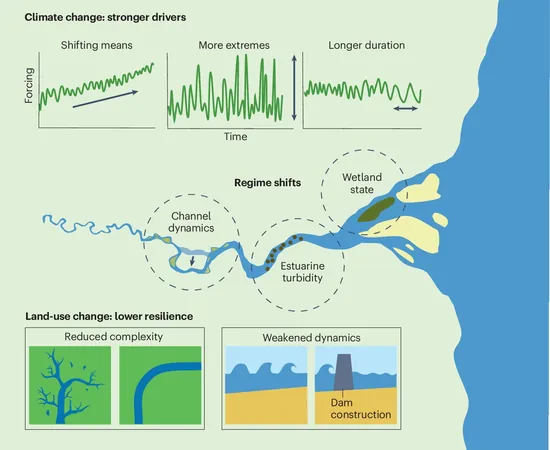
The Incredible Secret Behind Why We Aren't Crushed by Earth's Atmosphere!
2024-11-24
Author: Emma
Introduction
Have you ever gazed up at the vast expanse of the sky and wondered about the enormous weight of the air pressing down on us? Straddling around 62 miles (100 kilometers) above our planet, the Kármán line marks the boundary between Earth's atmosphere and the emptiness of space. Yet, an astounding 99.9% of our atmosphere's mass is concentrated within just 30 miles (48 km) from the surface, according to atmospheric science expert Anthony Broccoli from Rutgers University.
How Heavy is the Atmosphere?
But just how heavy is this invisible blanket of air? Broccoli reveals that the total mass of Earth's atmosphere is a staggering 5.1 billion billion kilograms (or 11.24 billion billion pounds). To put this into perspective, a cylindrical column of air measuring just 1 foot (0.3 meters) in diameter weighs approximately 1,663 pounds (754 kilograms).
Why Aren't We Crushed?
So, why are we not crushed under this immense weight? The answer lies in the distribution of air pressure around our bodies. As Broccoli explains, 'the pressure from air is exerted uniformly on all parts of a person's body — it is not just a downward force.' This uniform pressure means that while we feel the weight of air pushing against us, it affects us evenly from all directions.
The Balance of Air Pressure
Despite this pressure being non-trivial — roughly 14.7 pounds per square inch (about the weight of a large bowling ball) — human bodies have adapted to withstand it over time. Michael Wood, a quantitative sciences expert at Canisius University, emphasizes that our internal air pressure pushes outward in perfect balance with the atmospheric pressure around us, keeping us safe from being squished.
When the Balance is Disrupted
However, things change when air can't reach all sides. For example, if you were to press a vacuum cleaner nozzle against your skin, you would quickly feel the force of the external air pushing against the vacuum hose because the air pressure around your hand is no longer equalized.
Effects of Altitude on Atmospheric Pressure
Moreover, did you know that atmospheric pressure decreases with altitude? This is why passengers often experience a painful “pop” in their ears during airplane ascents and descents. As you ascend, the air gets thinner, causing pressure disparities that take time to balance out, leading to that familiar popping sensation when the pressures finally equalize.
Conclusion
So the next time you look up at the sky, remember: our bodies are masterfully designed to handle the weight of the atmosphere! Isn't it fascinating how evolution has prepared us for life on Earth? Stay curious about the world around you; there's so much more to explore about the science that keeps us grounded (literally)!









 Brasil (PT)
Brasil (PT)
 Canada (EN)
Canada (EN)
 Chile (ES)
Chile (ES)
 España (ES)
España (ES)
 France (FR)
France (FR)
 Hong Kong (EN)
Hong Kong (EN)
 Italia (IT)
Italia (IT)
 日本 (JA)
日本 (JA)
 Magyarország (HU)
Magyarország (HU)
 Norge (NO)
Norge (NO)
 Polska (PL)
Polska (PL)
 Schweiz (DE)
Schweiz (DE)
 Singapore (EN)
Singapore (EN)
 Sverige (SV)
Sverige (SV)
 Suomi (FI)
Suomi (FI)
 Türkiye (TR)
Türkiye (TR)